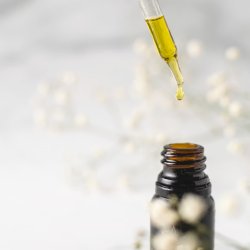The Top 10 Health Benefits of CBD Oil
CBD oil, derived from the cannabis plant, has gained attention for its potential therapeutic uses. Cannabis-based medicine is legally prescribed in the UK for specific medical conditions such as epilepsy and nausea during chemotherapy, with strict regulations on THC content and prescription stipulations. Unlike THC, CBD (cannabidiol) does not produce the “high” commonly associated with cannabis. Research has explored various benefits of CBD oil, providing evidence for its role in addressing multiple health concerns. While more research is needed in many areas, we’ve put together the top 10 health benefits of CBD oil and how it may help with a range of health concerns.
1. Pain Relief
One of the most well-known uses of CBD oil is its ability to relieve pain. CBD oil has shown promise in alleviating pain and muscle spasms associated with multiple sclerosis. CBD interacts with the endocannabinoid system (ECS), which regulates pain, immune response, and sleep. Research has shown that CBD can reduce chronic pain by influencing endocannabinoid receptor activity, decreasing inflammation, and interacting with neurotransmitters.
2. Anti-Inflammatory Properties
CBD oil is recognised for its anti-inflammatory effects. Full-spectrum CBD oils include a range of cannabinoids, which may enhance their anti-inflammatory effects. Studies suggest that CBD can reduce inflammation by inhibiting the production of pro-inflammatory molecules called cytokines. This makes it potentially beneficial for conditions like arthritis and other inflammatory diseases. It can be used sublingually or in a topical form directly where you are experiencing the inflammation.
3. Anxiety and Depression Relief
CBD has been studied for its potential to reduce anxiety and depression, which are common mental health disorders. Additionally, CBD oil has shown potential in alleviating symptoms of post-traumatic stress disorder (PTSD). CBD may influence serotonin receptors in the brain, which play a role in mood and behaviour. Clinical trials have demonstrated that CBD can significantly reduce anxiety, particularly social anxiety.
4. Neuroprotective Benefits
CBD’s neuroprotective properties are of great interest, particularly for helping people with neurological disorders. Human studies are crucial for understanding the neuroprotective benefits of CBD oil. Research has shown that CBD can reduce the frequency of seizures in epilepsy, especially in rare forms like Dravet syndrome and Lennox-Gastaut syndrome. CBD is also being studied for its potential to treat neurodegenerative diseases such as Alzheimer’s and Parkinson’s.
5. Heart Health
Recent research suggests that CBD oil may benefit heart health. Its ability to reduce blood pressure has been shown in studies involving stress management. By reducing oxidative stress and inflammation, CBD may also contribute to a healthier cardiovascular system.
6. Cancer Treatment
The research on CBD oil and cancer is not significant and to date, it cannot be used as any kind of treatment. However, medical cannabis, including CBD oil, is sometimes prescribed for cancer-related symptoms such as nausea and pain. CBD oil has been explored as a treatment for cancer-related symptoms such as nausea, vomiting, and pain. Some studies suggest that CBD, in combination with THC, may help reduce the side effects of chemotherapy.
7. Skin Health
CBD’s anti-inflammatory and antioxidant properties have made it a popular ingredient in skincare products. Studies suggest that CBD oil can help treat acne by reducing sebum production and preventing the activation of inflammatory cytokines. CBD's antioxidant properties have the potential to help reduce the visible signs of ageing.
8. Improves Sleep
Whether you simply have trouble sleeping or have a diagnosed sleep disorder such as insomnia, CBD could potentially help. Research indicates that CBD can improve sleep quality by addressing the underlying causes of poor sleep, such as anxiety, pain, or stress. Unlike other sleep aids, CBD does not appear to cause dependency or major side effects.
9. Supporting Addiction Recovery
CBD has shown promise in helping people recover from addiction. It may also help reduce reliance on other medications in the context of addiction recovery. It appears to reduce cravings and anxiety in individuals addicted to substances such as opioids, tobacco, and alcohol. By affecting the brain circuits related to addiction, CBD may reduce the likelihood of relapse. Additionally, early studies suggest that CBD could potentially help manage withdrawal symptoms, making the recovery process smoother. The non-addictive nature of CBD makes it a useful supplement but as research is still in its infancy, further studies are needed.
10. Mental Health Support
Beyond anxiety and depression, CBD is being researched for its potential role in managing other mental health disorders such as PTSD, schizophrenia and bipolar disorder. CBD products, including oils, capsules, and edibles, can be used to support mental health. While more research is needed, some studies have found that CBD can reduce symptoms and improve the quality of life for those affected by these conditions. Furthermore, CBD’s non-psychoactive nature makes it an attractive option for patients seeking alternatives to traditional psychiatric medications.
CBD Oil for Improved Health and Wellness
Incorporating a quality CBD product into your daily life could have benefits for your overall health or particular conditions. While research is ongoing and more studies are needed in many areas, the many beneficial properties of CBD make it a popular supplement. Goodrays CBD oil is a high-grade choice using 100% THC-free Colorado-grown CBD, ideal for adding a natural health supplement to your daily routine.
Frequently Asked Questions
- How quickly can I expect to see benefits from CBD oil?
The effects of CBD oil can vary by individual. Some people notice improvements within a few days, while others may take several weeks to experience significant benefits.
- Are there any side effects associated with CBD oil?
CBD oil is generally well-tolerated, but potential side effects may include dizziness, dry mouth, or changes in appetite. Always consult with a healthcare provider before starting any new supplement.
- Can I use CBD oil alongside other medications?
CBD oil may interact with certain medications. It's important to discuss its use with a healthcare professional to avoid potential interactions.
- What is the recommended dosage for CBD oil?
There is no one-size-fits-all dosage for CBD oil. It is best to start with a low dose and gradually adjust based on individual needs and response. Consulting a healthcare provider for personalized dosing is recommended.
- Where should I store my CBD oil?
CBD oil should be stored in a cool, dark place to maintain its potency. Avoid exposure to heat and light, which can degrade the oil over time.





